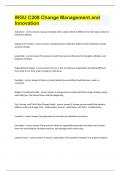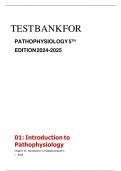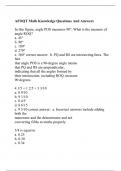Summary European Law
Week 1
Right of establishment has a permanent (stable) link with host MS, article 49 TFEU.
Right to provide services has a more temporary (continuous) relationship with host MS,
articles 56 and 57 TFEU.
Treaties require positive or negative integration.
- Positive integration occurs through harmonization
- Negative integration occurs through prohibitions
Art. 49 TFEU: restrictions on the freedom of establishment of nationals of a MS are prohibited . Such
prohibition shall also apply to restrictions on the setting-up of agencies, branches or subsidiaries by
nationals of any MS.
The freedom of establishment shall include the right to take up and pursue activities as self-
employed persons and to set up and manage undertakings, in particular companies or firms
according to the 2nd paragraph of article 54. Article 54 says that companies or firms shall be treated in
the same way as natural persons.
Art. 49 TFEU covers two situations: (not sure if literature).
- Primary establishment is the right for a natural or legal person to set up and manage
undertakings, in particular firms and companies, in other MS.
- Secondary establishment provides the right for legal persons to set up agencies, branches or
subsidiaries in another MS.
Art. 56 TFEU: restrictions on freedom to provide services within the Union shall be prohibited.
Art. 57 TFEU: Services are considered services when they provided for remuneration, in so far as they
are not governed by the provisions relating to freedom of movement for goods, capital and persons.
Conditions of art. 56 & 57 TFEU:
- No other freedoms (like freedom of movement for goods or capital)
- Service
- Payment (no voluntary services)
- Temporary (duration, regularity, periodical nature or continuity)
- Cross-border element (someone provides a service in another country or someone receives a
service in another country or provider and recipient move cross border or the service itself
moves to another country.)
- Equipped with infrastructure: offices or consulting rooms.
The material scope of art. 56 & 57 form three situations:
- The freedom to travel to provide services
- The freedom to travel to receive services
- Neither the provider nor the recipient travel (electronic services)
Examples of services are medical services such as the termination of a pregnancy, education judicial
recovery of debts.
,Art. 56 TFEU requires MS to remove national laws which interfere with the free movement of
services and cannot be justified. (negative obligation)
Legislation requires MS to adapt their rules to accommodate EU obligations (harmonizing legislation)
imposing positive obligations on MS
Host vs home state
The host state controls the activities of the migrant person/company in the case of freedom of
establishment, meanwhile the home state controls the activities of the migrant person/company in
the case of free movement of services.
To whom/what does art. 49 and 56 TFEU apply:
Articles 49 and 56 have vertical direct effect, they apply to MS. In the ECJ Viking (§ 58) the court
hinted that there is indeed a horizontal effect.
Discrimination approach
- Direct discrimination: solely based on nationality
- Indirect discrimination: the effect of the rule is discriminatory, the rule itself isn’t. (language
or residency requirement)
Restrictions and measures that market access approach
Market access-restrictions cannot be discriminatory.
Market access-restrictions are not discriminatory as long as they are universal
Discriminatory = all (but home or foreign) companies are being hindered by a Member State.
o In ECJ Alpine Investments the Court ruled that: the Dutch rule directly affects access
to markets in services in the other Member States and is thus capable of hindering
intra- Union trade in services.
Derogations and justification
- The question is whether MS can justify the rules
- Sometimes a MS is justified to make derogations upon the free movement rules.
- The justification grounds are mentioned in art. 52 and 62 TFEU
o Public policy
o Public security
o Public health
Public interest justifications
A MS has certain grounds on which it can justify its market access restrictions and indirect
discriminatory measures. These are called public interest/objective justifications. A MS has to, when
it implies such rules, show that the measures take are proportionate (suitable & not beyond
necessary) and where appropriate, compatible with human rights.
Examples are preventing gambling, avoiding risk of crime or fraud or combatting money laundering
The Services Directive 2006/13: (services directive)
Four pillars:
1. To ease freedom of establishment for providers and the freedom of provision of services in
the EU.
2. To strengthen rights of recipients of services as users of the latter.
3. To promote the quality of services.
, 4. To establish effective administrative cooperation among the Member States.
- The Directive establishes a general legal framework for any service provided for economic
return (with the exception of excluded sectors) while taking the specific nature of certain
activities or professions into account.
- Service means any self-employed economic activity provided for remuneration as in art 57
TFEU
- Specifics can be found in art. 2 of the Directive.
- Exclusions can be found in sub 2 of art. 2 of the Directive. Only when other movements do
not apply
Jurisprudence
- Josemans: art. 56 TFEU, not being allowed to sell cannabis to foreigners is a restriction on the
freedom to provide services. Justification: objective of combatting drug tourism
- Gebhard: distinction between 49 and 56, difference between articles is continuity, also
introduced rule of reason
- Alpine investments: art 56, prohibition of making calls to potential clients to another MS to
offer services. Justification: protection of domestic market
- Watts: medical services fall within the scope of art 56. Having to ask for compensation prior
to undergoing treatment in another MS is justified on the grounds of protecting financial
balance of a social security system.
Step by step:
Art 56 according to Gebhard:
- Scope: Personal scope if he/she is a national of a MS or does the company have a
corporate seat in a MS? Material scope of 49 and 56/57 are both countries MS
(crossborder element) and also look for economic activity and if there is a remuneration
(stated in art. 57)? Also §42 Josemans says it has to be a legal activity.
- Economic activity (service)
- Temporary nature (duration, regularity, periodical nature and continuity) art. 57 and §26
o The difference between the two is the basis on which the economic activity is performed:
for freedom of establishment the activities have to be performed on a stable and
continuous basis, for services on a more temporary basis (see para 25 and 26 Gebhard).
In order to determine this, the duration, regularity, periodicity and continuity of the
provision of the service are relevant (para 39 Gebhard)
- Then look if services directive applies. Exclusions found in art. 2(2).
- Look if there is a restriction (discrimination or market access breach) Look if the ‘rule or
requirement’ is applicable to every person or only the person that doesn’t agree with it. if
it is applicable to everyone = indirect discrimination
- Are there justifications? (proportionate and compatible with human rights or rule of reason)
Art 49
- Personal Scope is the company based in MS or is he/she a national? Material scope of 49
and 56/57 interstate element, is the company making use of other MS company to
perform activities there (crossborder element)? Also look if economic activity must be
renumeration (stated in art. 57 but also applicable for art. 49) Also §42 Josemans says it has
to be a legal activity.
- Stable & continuous basis §25 gebhard (duration, regularity, periodical nature and continuity
§39).
Week 1
Right of establishment has a permanent (stable) link with host MS, article 49 TFEU.
Right to provide services has a more temporary (continuous) relationship with host MS,
articles 56 and 57 TFEU.
Treaties require positive or negative integration.
- Positive integration occurs through harmonization
- Negative integration occurs through prohibitions
Art. 49 TFEU: restrictions on the freedom of establishment of nationals of a MS are prohibited . Such
prohibition shall also apply to restrictions on the setting-up of agencies, branches or subsidiaries by
nationals of any MS.
The freedom of establishment shall include the right to take up and pursue activities as self-
employed persons and to set up and manage undertakings, in particular companies or firms
according to the 2nd paragraph of article 54. Article 54 says that companies or firms shall be treated in
the same way as natural persons.
Art. 49 TFEU covers two situations: (not sure if literature).
- Primary establishment is the right for a natural or legal person to set up and manage
undertakings, in particular firms and companies, in other MS.
- Secondary establishment provides the right for legal persons to set up agencies, branches or
subsidiaries in another MS.
Art. 56 TFEU: restrictions on freedom to provide services within the Union shall be prohibited.
Art. 57 TFEU: Services are considered services when they provided for remuneration, in so far as they
are not governed by the provisions relating to freedom of movement for goods, capital and persons.
Conditions of art. 56 & 57 TFEU:
- No other freedoms (like freedom of movement for goods or capital)
- Service
- Payment (no voluntary services)
- Temporary (duration, regularity, periodical nature or continuity)
- Cross-border element (someone provides a service in another country or someone receives a
service in another country or provider and recipient move cross border or the service itself
moves to another country.)
- Equipped with infrastructure: offices or consulting rooms.
The material scope of art. 56 & 57 form three situations:
- The freedom to travel to provide services
- The freedom to travel to receive services
- Neither the provider nor the recipient travel (electronic services)
Examples of services are medical services such as the termination of a pregnancy, education judicial
recovery of debts.
,Art. 56 TFEU requires MS to remove national laws which interfere with the free movement of
services and cannot be justified. (negative obligation)
Legislation requires MS to adapt their rules to accommodate EU obligations (harmonizing legislation)
imposing positive obligations on MS
Host vs home state
The host state controls the activities of the migrant person/company in the case of freedom of
establishment, meanwhile the home state controls the activities of the migrant person/company in
the case of free movement of services.
To whom/what does art. 49 and 56 TFEU apply:
Articles 49 and 56 have vertical direct effect, they apply to MS. In the ECJ Viking (§ 58) the court
hinted that there is indeed a horizontal effect.
Discrimination approach
- Direct discrimination: solely based on nationality
- Indirect discrimination: the effect of the rule is discriminatory, the rule itself isn’t. (language
or residency requirement)
Restrictions and measures that market access approach
Market access-restrictions cannot be discriminatory.
Market access-restrictions are not discriminatory as long as they are universal
Discriminatory = all (but home or foreign) companies are being hindered by a Member State.
o In ECJ Alpine Investments the Court ruled that: the Dutch rule directly affects access
to markets in services in the other Member States and is thus capable of hindering
intra- Union trade in services.
Derogations and justification
- The question is whether MS can justify the rules
- Sometimes a MS is justified to make derogations upon the free movement rules.
- The justification grounds are mentioned in art. 52 and 62 TFEU
o Public policy
o Public security
o Public health
Public interest justifications
A MS has certain grounds on which it can justify its market access restrictions and indirect
discriminatory measures. These are called public interest/objective justifications. A MS has to, when
it implies such rules, show that the measures take are proportionate (suitable & not beyond
necessary) and where appropriate, compatible with human rights.
Examples are preventing gambling, avoiding risk of crime or fraud or combatting money laundering
The Services Directive 2006/13: (services directive)
Four pillars:
1. To ease freedom of establishment for providers and the freedom of provision of services in
the EU.
2. To strengthen rights of recipients of services as users of the latter.
3. To promote the quality of services.
, 4. To establish effective administrative cooperation among the Member States.
- The Directive establishes a general legal framework for any service provided for economic
return (with the exception of excluded sectors) while taking the specific nature of certain
activities or professions into account.
- Service means any self-employed economic activity provided for remuneration as in art 57
TFEU
- Specifics can be found in art. 2 of the Directive.
- Exclusions can be found in sub 2 of art. 2 of the Directive. Only when other movements do
not apply
Jurisprudence
- Josemans: art. 56 TFEU, not being allowed to sell cannabis to foreigners is a restriction on the
freedom to provide services. Justification: objective of combatting drug tourism
- Gebhard: distinction between 49 and 56, difference between articles is continuity, also
introduced rule of reason
- Alpine investments: art 56, prohibition of making calls to potential clients to another MS to
offer services. Justification: protection of domestic market
- Watts: medical services fall within the scope of art 56. Having to ask for compensation prior
to undergoing treatment in another MS is justified on the grounds of protecting financial
balance of a social security system.
Step by step:
Art 56 according to Gebhard:
- Scope: Personal scope if he/she is a national of a MS or does the company have a
corporate seat in a MS? Material scope of 49 and 56/57 are both countries MS
(crossborder element) and also look for economic activity and if there is a remuneration
(stated in art. 57)? Also §42 Josemans says it has to be a legal activity.
- Economic activity (service)
- Temporary nature (duration, regularity, periodical nature and continuity) art. 57 and §26
o The difference between the two is the basis on which the economic activity is performed:
for freedom of establishment the activities have to be performed on a stable and
continuous basis, for services on a more temporary basis (see para 25 and 26 Gebhard).
In order to determine this, the duration, regularity, periodicity and continuity of the
provision of the service are relevant (para 39 Gebhard)
- Then look if services directive applies. Exclusions found in art. 2(2).
- Look if there is a restriction (discrimination or market access breach) Look if the ‘rule or
requirement’ is applicable to every person or only the person that doesn’t agree with it. if
it is applicable to everyone = indirect discrimination
- Are there justifications? (proportionate and compatible with human rights or rule of reason)
Art 49
- Personal Scope is the company based in MS or is he/she a national? Material scope of 49
and 56/57 interstate element, is the company making use of other MS company to
perform activities there (crossborder element)? Also look if economic activity must be
renumeration (stated in art. 57 but also applicable for art. 49) Also §42 Josemans says it has
to be a legal activity.
- Stable & continuous basis §25 gebhard (duration, regularity, periodical nature and continuity
§39).








